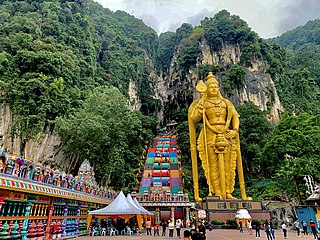
Batu Caves is a mogote with a series of limestone caves in Gombak, Selangor, Malaysia. It is located about 13 km (8.1 mi) north of the capital city of Kuala Lumpur. The cave complex contains many Hindu temples, the most popular of which is a shrine dedicated to Tamil god Murugan. It is the focal point of the Tamil festival of Thaipusam in Malaysia. The complex also hosts a 43 m (141 ft) high Murugan statue, one of the largest Murugan statues in the world.
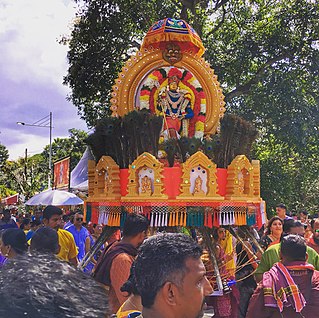
Thaipusam or Thaipoosam is a Tamil Hindu festival celebrated on the first full moon day of the Tamil month of Thai coinciding with Pusam star. The festival is celebrated to commemorate the victory of Hindu god Murugan over the demon Surapadman. During the battle, Murugan is believed to have wielded a vel, a divine spear granted by his mother, Parvati.
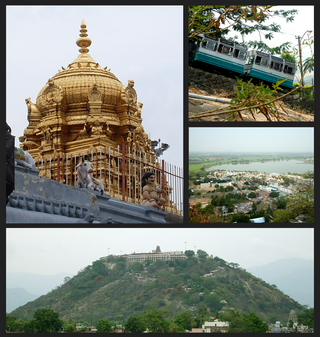
Palani or Pazhani(Tamil:[paɻani]), is a town in Dindigul district of Tamil Nadu state in India. It is located about 54 kilometres (34 mi) west of Dindigul, 106 kilometres (66 mi) south-east of Coimbatore, 122 kilometres (76 mi) north-west of Madurai, 67 kilometres (42 mi) from Kodaikanal. The Palani Murugan Temple or Arulmigu Dhandayuthapani Swamy Temple, dedicated to Murugan is situated on a hill overlooking the town. The temple is visited by more than 7 million pilgrims each year. As of 2011, the town had a population of 70,467 and the Taluk had a population of 292,301 which makes it the second largest town in the district after Dindigul.

Vel is a divine spear associated with Kartikeya, the Hindu god of war.

The Arulmigu Sri Mahamariamman Temple is a Hindu temple within George Town in the Malaysian state of Penang. The oldest Hindu temple in the state, it was built in 1833, and features sculptures of gods and goddesses over its main entrance and facade.

The Swaminatha Swamy Temple is a Hindu temple dedicated to god Murugan. It is located in Swamimalai, 5 km from Kumbakonam, on the banks of a tributary of river Kaveri in Thanjavur District, 290 km from Chennai, the capital of Tamil Nadu, India. The temple is fourth abode of Murugan among six (Arupadaiveedugal). The shrine of the presiding deity, Swaminathaswamy is located atop a 60 ft (18 m) hillock and the shrine of his mother Meenakshi (Parvati) and father Shiva (Sundareswarar) is located downhill. The temple has three gopuram, three precincts and sixty steps and each one is named after the sixty Tamil years. The temple has six daily rituals at various times from 5:30 a.m. to 9 p.m., and three yearly festivals on its calendar. The annual Vaikasi Visagam festival is attended by thousands of devotees from far and near.

Dhandayuthapani Swamy Temple is a Hindu temple dedicated to Murugan situated atop a hillock amidst the Palani Hills in Palani, Dindigul district of Tamil Nadu. It is one of the Six Abodes of Murugan. The temple is managed by the Hindu Religious and Charitable Endowments Department of the Government of Tamil Nadu.
Kaduvettividuthy is a village in Thanjavur District, Tamil Nadu.

The Ettampadai is a temple of Lord Murugan (Subrahmanya) in India, located in the neighbourhood of Triplicane (Thiruvallikkeni) in Chennai.

The Six Abodes of Murugan are six temples situated in the state of Tamil Nadu in South India, dedicated to the Hindu deity Murugan. These six sacred abodes of Murugan are mentioned in Tamil Sangam literature, in the texts of Tirumurukāṟṟuppaṭai, written by Nakkīraṉãr, and in Tiruppukaḻ, written by Arunagirinathar. The six abodes are Thiruparankundram, Tiruchendur, Palani, Swamimalai, Tiruttani, and Pazhamudircholai.
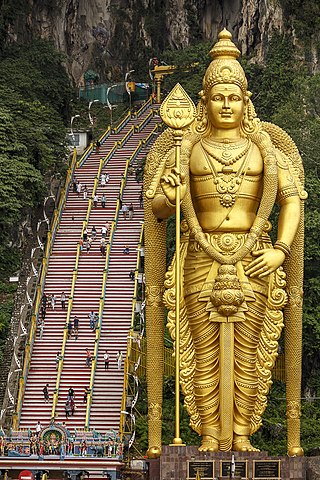
Kaumaram is a Hindu denomination that primarily venerates the Hindu deity of war, Kartikeya, also known as Kumaran, Murugan, Arumugan, and Subrahmanyan. Devotees of Kumaran, called Kaumaras, also revere members of his family: Parvati, Shiva, and Ganesha, as well his consorts, Devasena and Sundaravalli, the daughters of Vishnu in Tamil tradition. The important theological texts relating to Kumara are a part of the Shaiva agama canon. This sub-tradition is found among the Tamils, Kannadigas, and the Vedda, in South India, Sri Lanka, and among the Tamil diaspora worldwide. The love story of Kumara/Murugan and his wife Valli, a girl from a local tribe, is popular in Tamil Nadu, where Kumara acquired the status of a national god.
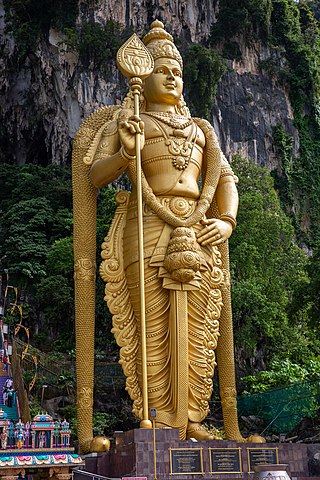
Kartikeya, also known as Skanda, Subrahmanya, Shanmukha and Murugan, is the Hindu god of war. He is generally described as the son of the deities Shiva and Parvati and the brother of Ganesha.
Murugan or Balathandayuthapaniswamy temple is a Hindu temple situated in the village of Kumaranmalai at a distance of 10 kilometres from Pudukkottai in the Pudukottai district in Tamil Nadu, India. The temple is dedicated to the Hindu god Murugan and is situated on a small hillock. The temple encompasses a sacred tank whose water is considered holy.

Pachaimalai Arulmigu Subramanya Swamy Temple, also known as the Pachaimalai Balamurugan Temple, is one of the two major hill temples located in Gobichettipalayam, Tamil Nadu, India. The temple is dedicated to the Lord Murugan. The temple is constructed in the Tamil style of architecture and is located on top of a small hillock in the outskirts of the town of Gobichettipalayam near Pudupalayam, Tamil Nadu. Here, Kartikeya is venerated as Balamurugan or Subramanya Swamy.

The Arulmigu Balathandayuthapani Temple, also known as the Waterfall Hilltop Temple, is a Hindu temple within George Town in the Malaysian state of Penang. Dedicated to Lord Murugan, the hilltop temple, with its seven-storey 21.6 m-tall gopuram, has been touted as the largest Lord Murugan temple outside India. It is sited comparatively higher above ground than Batu Caves, with devotees having to climb over 500 steps to access the place of worship.

Idumban is an asura in Hinduism, featured in Tamil mythology. Idumban is described to be a devotee of the deity Murugan (Kartikeya), regarded by adherents to be a guardian of the deity's temples in Tamil Nadu. He is also associated with the ritual practice of the Kavadi Aattam, in which his veneration is regarded to be a prerequisite.
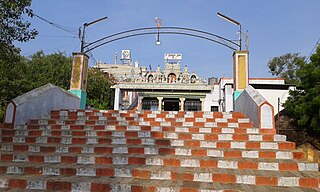
Karunellinathar temple is a Hindu temple dedicated to Shiva, located in Thiruthangal, a town in the outskirts of Sivakasi, a in Tamil Nadu, India. Shiva is worshiped as Karunellinathar, and is represented by the lingam and his consort Parvati is depicted as Chokki Amman.

Kolanjiappar temple in Manavalanallur, a village on the outskirts of Virudhachalam in Cuddalore district in the South Indian state of Tamil Nadu, is dedicated to the Hindu god Murugan. Constructed in the Dravidian architecture, the temple is located in the Virudhachalam - Manavalanallur Road. The legend of the temple is associated with Saivite saint Sundarar and the Vriddhagiriswarar temple ad Virudhachalam.

Jnana palam, also rendered Gnana Palam, is the name of a divine fruit in Hindu mythology. It is associated with the myth of Murugan and Ganesha participating in a contest, and the former's sacred abode of Palani. Presented by the sage Narada to Shiva, the jnana palam is regarded to have possessed the elixir of wisdom. In some iterations, the jnana palam is described to be a golden mango.

Vaikasi Visakam is a Tamil Hindu festival. It falls on the day the moon transits the Visaka nakshatram in Vaikasi (May-June), the second month of the Tamil Calendar. The festival is celebrated to commemorate the birth anniversary of Hindu god Murugan.




















